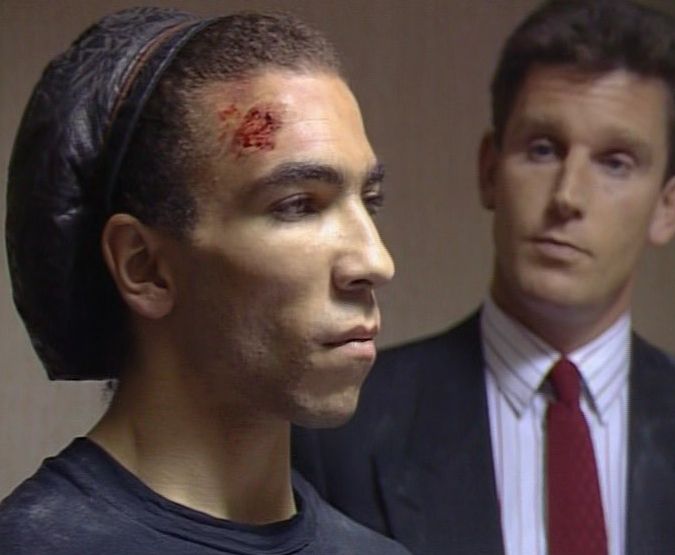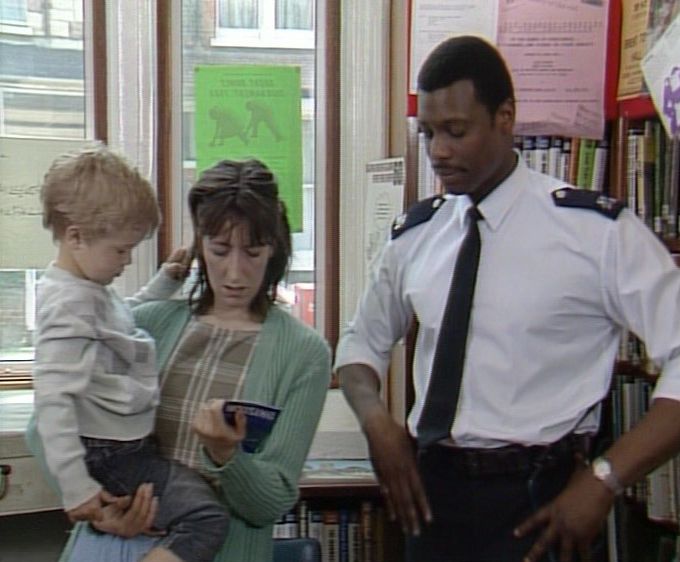
Barry Appleton’s Caught Red Handed juggles several plotlines at once and, as with previous episodes, it takes a little while before it becomes clear which ones will dominate and which will fade away.
The episode opens with the fallout from a stabbing. Jill Kelsey (Chrissie Cotterill) attacked her husband, John (Jim Barclay), with a breadknife – stabbing him eight times. It’s instructive to see how pretty much everybody (apart from Alec Peters) treats her with compassion, from Ted Roach at the scene to Inspector Frazer and Viv Martella at the nick. Jill Kelsey is positioned as a victim rather than a criminal, which explains why Ted’s usual brusque manner is absent.
Of course, the fact she stabbed her husband not once but eight times suggests this may be more than a family row which escalated. But she seems genuinely contrite and he – as soon as he regains consciousness – is completely forgiving and disinclined to press charges. It slightly stretches credibility that he recovers so quickly (after eight stab wounds? Clearly they were very shallow ones). His revelation that the argument started when he complained about soggy cornflakes signifies that this crime has a faintly comic air, strengthened when John turns up at Sun Hill to take his wife home.
So Burnside’s quite happy to let them go – the whole incident written off as a domestic – although it seems rather unlikely that he’d be discharged from hospital quite so soon (even if they were desperate for beds). That he turns up at the nick still dressed in his hospital pyjamas also seems a little unbelievable. There’s a late coda to this part of the story, which once again is played rather for laughs.
Attention then turns to an obbo at the local swimming baths with Tom Penny and June Ackland. This is chiefly of interest due to the way Tom reacts when put under stress (not very well). They’ve rigged up an observation point to monitor the changing rooms in an attempt to identity a thief who’s been rifling through the lockers.
When someone is spotted, June tells Tom to switch on the video recorder. This is a slight plot weakness – back in 1988 VHS tapes would have been quite cheap, so why not just keep the recorder running all the time? Although they catch the criminal, something goes wrong with the tape and they’re left with no visual evidence. This is enough to once again push Tom to breaking point – showing that whilst he appears to be fine on the surface, whenever there’s the merest hint of stress he’s liable to fold like a pack of cards. As before, there’s never any suggestion that he’s not in a fit state to do the job – or that the next time he makes a mistake it may have more fatal results – presumably everybody just expects that eventually he’ll pull himself together.
This part of the episode has a happy ending, money treated by the SOCO (Susan Curnow) was placed in the lockers. It contained an invisible red dye, which would stain the hands of anybody who handled it. Hence the episode title.
But Caught Red Handed could also refer to Yorkie Smith, who’s observed in the pub acting in a very suspicious manner. Frankly he wouldn’t make a very good criminal as he’s far too transparent (although his fashion sense – rolling up his jacket sleeves as though he was in Miami Vice – should certainly be against the law). Jim suspects he’s been buying drugs and a search of his locker reveals a packet of pills.
This places Jim in a moral quandary. After confronting Yorkie and a brief moment or two of soul searching he feels he has no alternative but to make it official. Later, Ted Roach is withering in his condemnation – telling Jim he may have irreparably damaged Yorkie’s career. Ted’s viewpoint would no doubt be shared by many of his colleagues, where it would be seen as closing ranks to protect your own, rather than concealing a crime.
Yorkie comes clean. The drugs are anabolic steroids, designed to help him rebuild his strength as a rugby player. He claims that many athletes take them (which is true, although his statement that it’s not an offence is a little harder to swallow).
Had Burnside not been DI then it’s possible it would have been dealt with unofficially. But Caught Red Handed provides us with early evidence that Burnside is keen to mould Sun Hill in his own image, and this incident gives him an ideal opportunity to clip the wings of the uniformed branch.
His summary of both Brownlow and Conway is insightfully caustic. He claims that Brownlow “is more interested in his golf swing and that converted barn he’s got up in the lakes than what goes down at Sun Hill”. He concedes that Conway is a good man and a good copper but that he has to play things “by the book. And that is a worse handicap that Brownlow’s golf swing.”

























